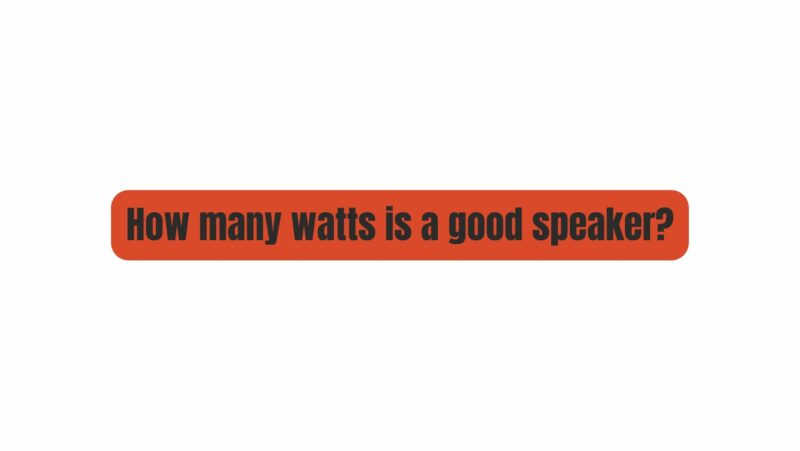In the world of audio equipment, determining how many watts constitute a good speaker is a question that often perplexes consumers. In this comprehensive guide, we will delve into the intricacies of speaker wattage, its relationship to performance, and the factors that influence what constitutes an appropriate wattage for various audio needs.
1. Understanding Speaker Wattage
To embark on our journey to determine what makes a good speaker in terms of wattage, we must first establish a clear understanding of what speaker wattage represents. Speaker wattage refers to the amount of electrical power (watts) a speaker can handle and convert into sound. It is a crucial specification that significantly influences a speaker’s overall performance.
2. Wattage vs. Loudness: The Common Misconception
One common misconception is that higher wattage automatically equates to louder sound. While wattage does play a role in loudness, it is just one of several factors. To assess what makes a good speaker in terms of wattage, we need to look beyond this oversimplified notion.
3. Speaker Sensitivity: The Efficiency Factor
Speaker sensitivity, typically measured in decibels (dB), is a key factor in determining how loud a speaker can play with a given amount of wattage. High-sensitivity speakers can achieve higher volumes with less power, while low-sensitivity speakers require more wattage for the same loudness. We’ll explore how sensitivity complements wattage considerations.
4. Room Size and Acoustics
The room in which you use your speakers significantly influences the perceived loudness and the appropriate wattage. Factors like room size, acoustics (including sound-absorbing materials and reflective surfaces), and speaker placement can impact the sound experience. We’ll discuss how room characteristics interact with wattage requirements.
5. Amplifier Power and Compatibility
To maximize speaker performance and longevity, it’s essential to pair your speakers with an amplifier that provides the right amount of power. Mismatched amplifiers can lead to underutilization or overloading of the speakers, affecting audio quality and durability. We’ll emphasize the importance of amplifier compatibility and its role in determining the appropriate wattage for your speakers.
6. Peak Power vs. RMS Power
Understanding the distinction between peak power and RMS (root mean square) power ratings is essential when evaluating speaker wattage. Peak power represents the maximum short-term power a speaker can handle, while RMS power indicates the continuous power it can sustain without damage. We’ll clarify the significance of these specifications and their practical implications.
7. Real-World Scenarios
To provide practical context, we’ll explore real-world scenarios where speaker wattage requirements differ. From home audio setups to professional studio environments and live performances, we’ll delve into how different situations may necessitate varying wattage levels to achieve optimal performance.
8. Balancing Wattage and Quality
In conclusion, determining what makes a good speaker in terms of wattage involves considering a complex interplay of factors, including speaker sensitivity, room characteristics, amplifier compatibility, and specific audio needs. A good speaker is not solely defined by wattage; it’s about ensuring that the speaker performs optimally in your unique audio environment.
By taking all these factors into account, you can make informed decisions when selecting speakers. Wattage is just one piece of the puzzle; it’s about achieving an exceptional audio experience that aligns with your preferences and requirements. Understanding the intricacies of speaker wattage empowers individuals to choose speakers that provide outstanding sound quality and performance, tailored to their specific needs.


